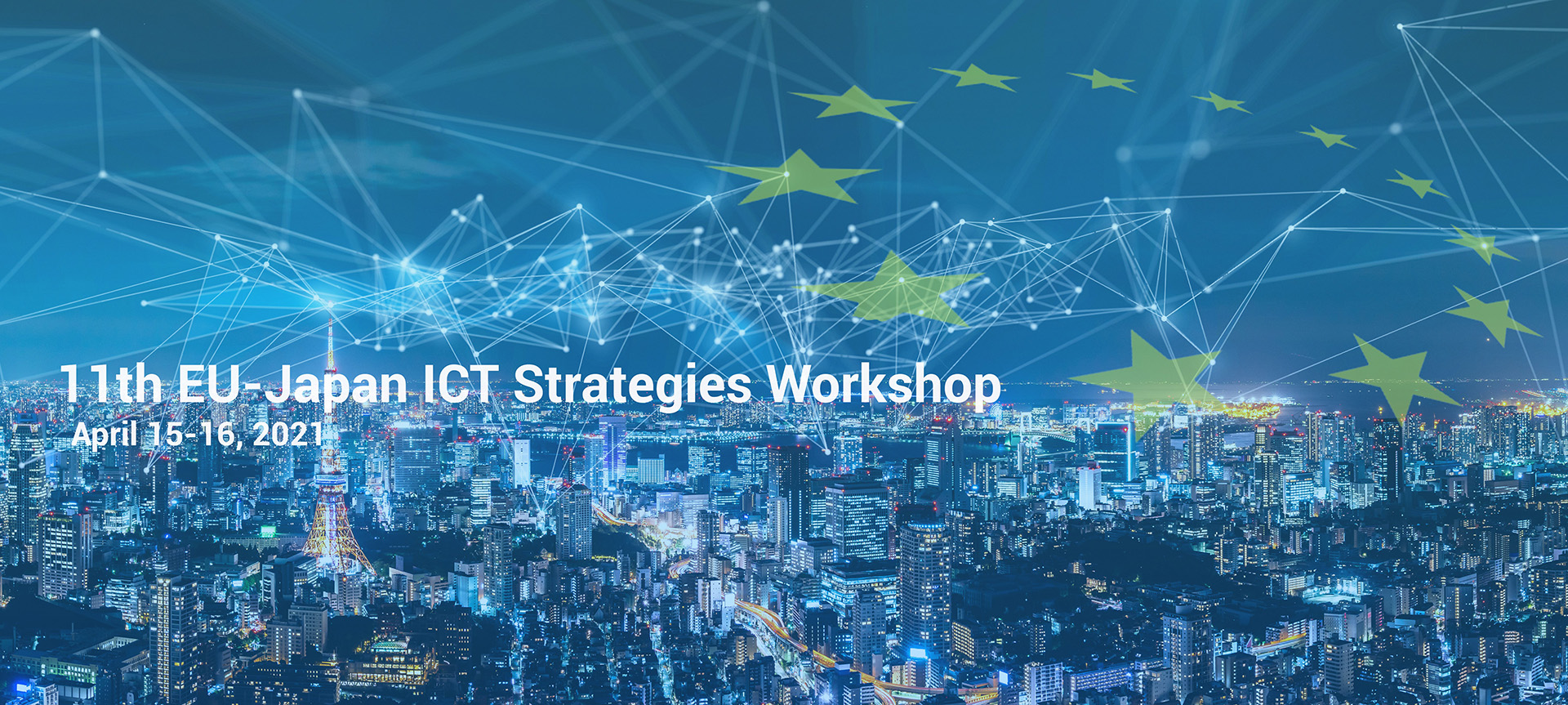The 11th EU-Japan ICT Strategies Workshop, co-chaired by the European Union and the Japanese government, took place online last week on April 15-16, 2021. Emphasis was laid on the importance of international cooperation and global standards.
Day 1 of the Workshop focused on the topic “5G and Beyond; Cyber Security; Smart Cities.” Day 2 focused on “Platforms; Data; Artificial Intelligence.”
Opening addresses on Digital Strategies Initiatives
The Workshop was kicked off by the co-chairs Eiji Makiguchi, Director-General of Global Strategy Bureau of MIC and Gerard de Graaf, Director for the Digital Transformation in Directorate-General "Communications Networks, Content & Technology" (DG CONNECT).
Thibaut Kleiner of DG Connect then outlined a major new EU initiative - Digital Compass. The COVID-19 pandemic highlighted the importance of digitisation for European society. Over the next decade, the EU’s vision is for a digital world that empowers people and businesses, and that is shaped around a human-centred, sustainable, and more prosperous approach.
And a key focus of the Digital Compass initiative will be about sharing a common vision with international cooperation - open, rule-based trade that creates a level playing field.
Further exchanges on Strategy for 5G and Beyond.
Yoshiaki Nagaya, Deputy Director, ICT Standardization Division, Global Strategy Bureau of MIC summarised that Digitalisation and Green/Sustainability will be the keys to growth moving forward and reiterated the importance of being able connect to high-speed networks from anywhere.
Akihiro Nakao, Professor, Tokyo University, B5G Promotion Consortium, laid out the roadmap for “Beyond 5G” technologies and emphasised that the R&D needed for Beyond 5G technologies cannot be realised by any one country alone - that the next generation of cyber infrastructure was a huge opportunity for global collaboration.
Yuji Tazaki, Senior Director, IOWN/6G Platform Development Office of Fujitsu, laid out how 5G was the critical social infrastructure that enabled the Internet of Everything and the importance of an open architecture that removed vendor lock-in and accelerated multi-vendor interoperability. Fujitsu also emphasised the centrality of the O-RAN (Open Radio Access Network) which is being adopted by operators and equipment manufacturers worldwide to reduce infrastructure deployment cost and lower the barrier to entry for new product innovation.
Pertti Jauhiainen, in charge of Future Connectivity Systems at EC DG CONNECT, presented the flagship and exploratory projects for 6G started on January 2021 and stressed the human aspects of the development of these new technologies and their impact on our future society.
Tonnie de Koster, International Advisor at DG CONNECT, announced that these exchanges would continue during the upcoming InDiCo Workshop on a common vision for beyond 5G in May 2021.
Colin Willcock, Chairman of the 5G – Infrastructure Association then presented the Smart Network Services Partnership as the main vehicle to implement joint Research and Innovation with partner countries.
The European industry was also represented at this workshop by Yoshio Honda from ERICSSON Japan and Jari Vaario from NOKIA Japan, who pointed out the importance of IPR policies and International SEP Licencing guidelines to enable the massive investments needed in research for beyond 5G and to lay the ground for collaborative innovation.
Cybersecurity and Interoperability
The important topic of cyber security was discussed. With more people relying on digital due to the pandemic and with the proliferation of IoT - 25 billion connected objects are expected to be online by 2025 - this all intensifies the need for a robust cyber-security strategy. French IOT specialist IOTEROP provided an industry perspective on how interoperability accelerates innovation and reduces the costs of devices and solutions and is an essential component of a sustainable technical ecosystem.
Xavier Piednoir from ETSI outlined the primary issues at the heart of Smart Cities and the importance on the oneM2M standards. Smart cities are a system of systems, which means several infrastructures coming from multiple providers, that need to be inter-connected - and this typically can lead to fragmentation. There was therefore a need to work on creating the glue that will allow seamless interconnection of services, without having to redesign or to roll out new infrastructure. The oneM2M global partnership has developed the common service layer which breaks the silos and allows verticals to communicate and exchange data.
Looking ahead
The InDiCo project enabled ETSI participation at the invitation of the European Commission to this 11th EU-Japan ICT Strategy Workshop for the third consecutive time, after the 9th Digital Strategy Workshop held on Dec 11-12, 2019 and the 10th Digital Strategy Workshop held on Dec 1-2, 2020. This illustrates the growing importance of International cooperation in the development of open global ICT standards, to lay the ground for breakthrough research and innovation and sustainable economic development.
A first step towards that goal will be taken at the upcoming EU-JP Workshop on common vision for beyond 5G standards next month.
